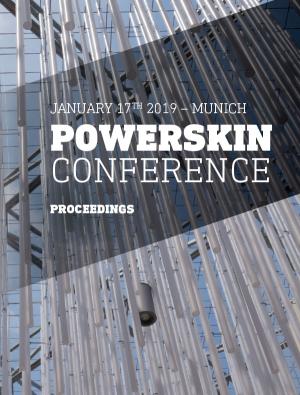Hosted by
POWERSKIN CONFERENCE 2019: PROCEEDINGS
Synopsis
The building skin has evolved enormously over the past decades. Energy performance and the environmental quality of buildings are significantly determined by the building envelope. The façade has experienced a change in its role as an adaptive climate control system that leverages the synergies between form, material, mechanical and energy systems in an integrated design.
The PowerSkin Conference aims to address the role of building skins to accomplish a carbon neutral building stock. Topics such as building operation, embodied energy, energy generation and storage in the context of envelope, energy and environment are considered. The 2019 issue of the PowerSkin Conference focuses on the digital processes in façade design and construction, showcasing presentations about recent scientific research and developments in the field. The main theme about digital tools and methods in façade design and construction is the overarching topic that combines the three subjects:
- Envelope: The building envelope as an interface for the interaction between indoor and outdoor environment. This topic is focused on function, technical development and material properties.
- Energy: New concepts, accomplished projects, and visions for the interaction between building structure, envelope and energy technologies.
- Environment: Façades or elements of façades, which aim for the provision of highly comfortable surroundings where environmental control strategies as well as energy generation and/or storage are an integrated part of an active skin.
The three universities Technical University of Munich, TU Darmstadt, and TU Delft are signing responsible for the organization of the conference. We have to thank the authors and speakers for their contribution and our teams for doing such a good job in organizing this event. Finally we have to thank our sponsors for their support and the Messe Mí¼nchen, which is so kind to give us the platform to organize such an event at their tradeshow BAU and by that create a link between academia and practice.

